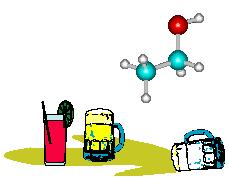Alcohol Use and Abuse:
|
 |
|
|
BIDS 295 Spring Term, 2018 T/Th 10:20am-11:45am Demerest Hall 117B |
|
|
Professor H. Wesley Professor H. Wesley Perkins, Dept. of Anthropology/Sociology, Stern Hall 216, ext. 3437, perkins@hws.edu, Office Hrs: T 3:00-4:45pm and Th 9:00-10:15am or by appointment.
Professor David W. Craig, Dept. of Chemistry, Rosenberg
111, ext. 3611, craig@hws.edu, Office Hrs: M/F 9:00am-noon, W 9:00-10:00am, Th 2:30-3:30pm.
Course Description
Alcoholic beverages are consumed by most adults in contemporary American society in a wide variety of social contexts. On the one hand, attractions, pleasures, and possible benefits of alcohol consumption can be identified as motivations for widespread use. On the other hand, the potentially debilitating pharmacological effect of alcohol as a drug and the costs of heavy drinking and alcoholism on the health of individuals, families, and society in general are enormous. This course examines the causes and consequences of alcohol use and misuse both in terms of its biochemical and social construction. This course brings together natural science and social science contributions to the interdisciplinary study of this phenomenon by incorporating a variety of academic perspectives including biology, chemistry, psychology, epidemiology, sociology, and public policy and by making extensive use of multimedia resources. We explore the effect of family, genetics, peers, ethnicity, and gender on drinking behavior along with the chemical properties and physiological effects of alcohol on the human body. Social patterns of drinking in various societal contexts will also be examined. Discussion of controversial issues concerning alcohol consumption will include concepts of abuse, theories of addiction, effective treatment approaches, blood alcohol limits for driving, minimum drinking age limits, treatment and punishment of DWI offenders, alcohol testing in work and sports contexts, and restrictions on advertising. Students are encouraged to develop course work that can be shared with the larger academic and local community. BD295 provides course credit for Sociology and Public Policy majors and minors. It has been recognized nationally as a model for courses about substance use and abuse by the U.S. Department of Education.
Course Requirements and Policies
Required texts and readings are listed here. The books are available in the college bookstore. Research articles are available in the library or reprints will be distributed in class. The Syllabus Schedule lists the dates for completion of assigned readings.
The Syllabus Schedule summarizes all assignment due dates, examinations, and the sequence of lecture/discussion topics.
Written Assignments in addition to required film showings and examinations are described here. All written assignments are described here along with infolink production requirements.
Grading Policies are described here.
Course Resources
Web Link Resources takes students to Hobart and william Smith Library resources, national research databases, and other World Wide Web links for alcohol and other drug research.
The Alcohol Education Project at Hobart and William Smith Colleges is a comprehensive array of initiatives directed toward alcohol and other drug and violence prevention in higher education including basic research, media campaigns, and curriculum programs.